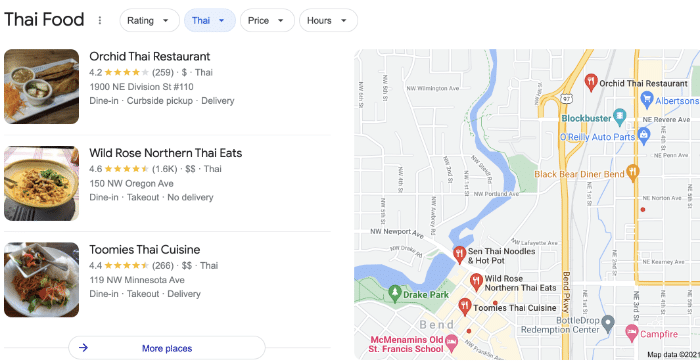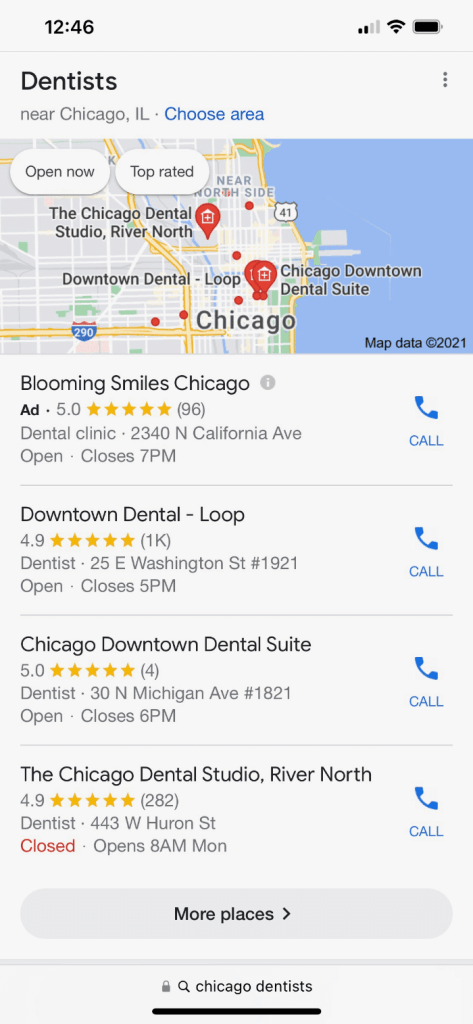Are you missing traffic opportunities because people aren’t searching the way you think they are?
If you haven’t optimized for voice search, this could be the case.
These six helpful voice search SEO strategies will help you get more organic traffic from people using Alexa, Siri, and Google Assistant, and contribute to your overall SEO strategy.
But first …
What is Voice Search?
Voice search enables people to search the Internet using regular speech. Devices with artificial intelligence can recognize your voice and query a search engine via voice recognition tech and natural language processing.
Although voice recognition has been around since the 1950s, it was only in 2011 when IBM’s Watson came out (you may have seen it beat contestants on Jeopardy!) that it became practical and relevant.
Voice search is now ubiquitous. Consider these voice search stats via Truelist, Techjury, and Vixen Labs:
- 30% of daily searches are voice-based
- 40% of adults use voice search daily
- 1 billion voice searches take place each month
- More than 40% of voice searches return results from featured snippets.
- 30% of all searches took place on screenless devices in 2020
- 58% of consumers use voice search to find a local business online
- 122.7 million Americans used voice search in 2021
- Google Assistant supports 30,000 smart home devices
- 45.1% of voice assistant users prefer Apple’s Siri
- Voice-based shopping will soar to $ 40 billion by 2022
And here are some stats from the recent Voice Consumer Index report by Vixen Labs:

… Voice will soon be a primary way consumers connect with the digital world, and a primay way that digital marketers will connect with consumers …
Jon Stine, Executive Director, Open Voice Network
3 Crucial Differences Between Voice Search Queries and Text Search Queries
The average person can speak 110-150 words per minute but only type between 38-40 words per minute. And it’s 3.75x faster to talk than it is to type.
So in a world where we are all moving more quickly than ever before, it’s no surprise that voice search has really begun to grow in use.
Voice search queries are longer: The average text search is between 1 and 3 words because today’s searchers know that search engines have matured to the point where they don’t need to enter complete sentences to get viable results.
Voice search uses natural language processing: When we use voice search, we are looking for answers to questions like:
Who/What: What are the best electric cars?
How: How do electric cars work?
Where: Where can I look at electric cars in my area?
When: Is the Tesla dealership open today?
Voice search is more locally-driven: Mobile voice searches are three times more likely to be location-based than text searches. For example, two of the most prominent uses cases for voice search queries are calling someone and asking for directions.
Popular Voice Search Devices and the Search Engines They Use
If you’re reading this article, you’re probably accessing it on a device with voice search capabilities — a smartphone, a tablet, or a desktop/laptop equipped with either Siri, Cortana, or Google Assistant.
Voice search is so popular because it is available on most of our devices, making it very easy to access.
Here are the top voice search devices and the search engines they use:
- Amazon Echo and Alexa use Bing
- Android phones and devices use Google
- Google Assistant uses Google
- Google Home uses Google
- iPhone, iPad, and Mac/Siri: Safari
- Microsoft Cortana uses Bing
It doesn’t matter if it’s a phone, a TV, a smart speaker, or another device — it can search the Internet using voice recognition technology and natural language processing.
[Please note that Amazon and Apple devices use Safari and Bing, respectively. Today, most SEO tactics are geared toward ranking on Google and ignore the other two at their peril when it comes to voice search.]
What Does Voice Search Have to Do with SEO?
What do you want Google to do when you enter a query?
First, it needs to understand your query to comprehend the types of results you’re looking for.
How we type Google queries is very different from how we talk to our voice assistants. If you’re looking for a local restaurant, this might be how your searches look:
- Typed: “Restaurants near me”
- Voice: “What are some good places to eat in my area?”
We tend to type very keyword-based searches. However, voice searches are much more conversational. In addition, search engines have become very good at understanding semantics, i.e., the meanings of words and phrases in a particular context.
Language is complex, and it’s challenging for machines to comprehend the meaning behind words. One example: The many words that have multiple meanings.
The rise of voice search has forced search engines to improve their voice recognition technology, with Google leading the way.
Per Moz:
In retrospect, the Hummingbird update could be seen as a step on Google’s path toward mastery of the inevitable rise of voice search. When Hummingbird was released in 2013, “conversational search” was making waves in the SEO community. Fast-forward just a few years and the emergence of voice search obliges Google to be equipped to understand fully natural language, using the spoken word for searches like, “Where’s the cheapest place for Mexican food near me?” or “How can I fix a leaky kitchen faucet?
This update, along with other ones, has changed SEO. It’s no longer about keywords (in the beginning, people would stuff keywords into articles) but user experience.
This shift has been influenced by voice search, which continues to play a role today with a constant focus on experience and not just keywords.
6 Tips for Voice Search Optimization
Voice search is here for the long-term. Voice search is everywhere. The percentage of voice-enabled devices continues to rise, with an estimated 122.7 Americans using voice search queries now.
You don’t need to change your existing SEO strategy to optimize for voice. Voice search is part of the trend to match user intent and provide the best user experience. Therefore, optimizing for voice search will help your SEO.
Optimize for Local Search
Most voice searches for local information are common; as I mentioned earlier, they are three times more likely than text-based searches to be local.
This makes perfect sense if you stop and think about it. It’s simple to use your smartphone to ask a question while you’re on the move and need a quick answer to your question. Therefore, it’s vital to focus on local SEO for your site.
Local SEO is an essential part of digital marketing for many businesses. Nearly 46% of all searches are local, indicating that there are many highly engaged buyers out there. If you’re a brick-and-mortar business, local people will likely drop by your store to make a purchase, underscoring the importance of optimizing your site to appear in local searches, especially voice searches.
The same principles apply to local SEO as regular SEO.
However, many small business websites often forget the most essential thing: telling people that you are a local business. So make sure that you create content relevant to your local area and include local keywords in your copy.
Create conversational but succinct content
SEO is no longer about stuffing content with keywords to please crawlers. Instead, SEO success requires authenticity, the use of natural language, and valuable content.
These ingredients are vital because voice search users speak more naturally when searching via speech vs. typing a query into a search engine.
Today’s rankings are focused on user experience. Pages that provide the best user experience and answer people’s questions will be at the top of the voice search rankings.
To rank high, you need to make it easy for people to find the concise and friendly information they are looking for and communicate with them in a natural, conversational manner. You’ll match the language people use in voice searches (user intent) while driving engagement using your brand voice.
Use structured data
Ask your voice-controlled device the following question: “What is the biggest animal in the world?”
What happens next?
Your device may start to read an answer about blue whales.
The information comes from a lengthy page about blue whales. So how does your device know what section to read?
Structured data is the answer.
Search engines consider many factors other than content to determine the relevance and place of your page in search results. Professional SEOs use these additional factors to optimize their content for search engines.
Schema markup is one factor. Although it does not directly affect rankings, it can give you an advantage over your competitors, especially when it comes to voice searches.
Schema markup is simply metadata: data about the information on your website. It is included in your site’s source codes. Although it is invisible to visitors, search engines can use microdata to help organize and classify your content. However, brands often overlook microdata because it is labor-intensive to create.
Here’s an example:
<script type="application/ld+json> { "@context": "https://schema.org", "@type": "Organization", "url": "https://www.yourcompanysite.com", "contactPoint": |{ "@type": "ContactPoint", "telephone": "+1-800-555-1212", "contactType": "customer service" }| } </script>This markup classifies your contact details pages as containing contact information.
So what does microdata have to do with voice search?
When searching for local businesses, users often search for contact information, hours of operation, addresses, directions from highways, and more. You can use microdata to ensure search engines classify this data.
I’ll look for a Thai place nearby.
 According to a 2018 Backlinko voice search study, more than 40% of voice search results were pulled directly from featured snippets. Featured snippets must include the exact information people are looking for because search engines look at this type of structured data when deciding what information should appear.
According to a 2018 Backlinko voice search study, more than 40% of voice search results were pulled directly from featured snippets. Featured snippets must include the exact information people are looking for because search engines look at this type of structured data when deciding what information should appear.
Claim your “Google My Business” Listing
Local SEO and voice search are essential components of your Google My Business listing.
People often use voice searches to learn essential details about your business, such as your contact number, address, and hours of operation, so Google must have accurate information on these details to return robust results.
Structured data and your website content are important in making sure Google has all the information it needs about your business. But Google also wants to be extremely accurate and will also look at your Google My Business listing.
Google will then have all the information it needs to know about your business, including who it’s for, when it opens, and where it’s located. This information is what voice search queries are looking for, so it’s an easy way to return the correct answers quickly.
 Be Mobile-Friendly
Be Mobile-Friendly
Most voice searches are now done via mobile.
So if you want to appear in search results on mobile devices, you need to provide a great mobile experience.
Although this is a key part of Google’s algorithm, many sites still aren’t optimized for mobile.
If your site isn’t, people will click on it and then leave right away because it doesn’t work correctly on their mobile device. Not being optimized for mobile will also hurt you in voice search ranking and traditional search ranking.
Modern SEO is all about user experience. Since most traffic (and almost all voice traffic) comes via mobile devices, you need to take time to optimize for mobile search — both voice and text.
Write Content That Answers Your Audience’s Most Frequently Asked Questions
When speaking, people tend to ask questions. They also do this when making voice search queries.
Google provides a great way to see the most frequently asked questions on your subject matter:
Enter a question related to your website content and look at the results. You will likely see a box called “people also ask.” This feature displays many questions and shows you what your target audience is asking.
Once you clearly understand what questions people use to search for information, you can create fantastic content that answers those questions. Again, it’s all about user experience and providing valuable content for your users.
Help people solve their problems, answer their questions, and make it fun — this will give you a great chance of a high voice search ranking.
Voice Search FAQs
What is voice search SEO?
Voice search SEO refers to optimizing your website to appear in search engine results pages (SERPs) for voice search queries.
Does voice search impact SEO practices?
SEO has seen a significant impact from voice search. Voice search is part of the trend to match user intent and provide the best user experience.
Why is voice search important for SEO?
Voice search is now possible on all devices. Voice searches have seen a massive increase in popularity. You might be missing a huge amount of your audience if you don’t optimize for natural language queries.
What percentage of searches are voice searches?
30% of all daily searches on Google, Bing, and Safari are voice-based and weekly usage is almost 50%.
How many people use voice search?
40% of adults use voice search daily.
How prevalent is voice search?
1 billion voice searches take place each month. 122.7 million Americans used voice search in 2021.
Is optimizing for voice search good for local SEO?
58% of consumers use voice search to find a local business online.
Voice Search Wrap-Up
A massive number of voice searches take place every day, so you should aim to rank well in voice searches to increase your organic traffic.
Not only are there a vast number of voice searches happening every day, but the techniques you use to optimize for these queries are a fundamental part of modern SEO.
Voice search tech has revolutionized how people look for information, and search engines have updated their algorithms to reflect this.
You need to respond, too. If you can match searcher intent and provide the best user experience, you can ensure that you’re getting the most organic traffic possible.
Are you optimizing for voice search yet?
Digital & Social Articles on Business 2 Community
(18)







